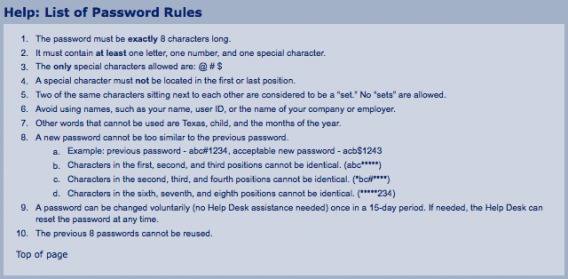Error Messages: Common Mistakes, Best Practices,
and Lots of Examples
Your users will make mistakes. It’s inevitable. That’s what error messages are for – but so many companies
fail to follow best practices, and they’re pissing off potential customers in the process...
Error messages can be so frustrating. How many times have you went [HD sic] to fill out a form to create an account, only to receive a message like this:
But computers aren't the only source of error messages.
My rechargeable radio, for instance, has an annoying drawback (among many – it was a Bad Buy). When it runs down, with its dying breath it remembers its current state (On, of course). I then recharge it, and when it's done this a helpful message appears on its screen "Fully charged – unplug charger".
But secretly – I don't have the headphones on at this stage – it remembers that it's On; so that when I go to switch it on again it's already flat. But, to the cognoscente of engineer-speak, there is a clue to this annoying behaviour: the expression Powering off.
<autobiographical_note date_range="1984-1998>
When I began working for DEC, in the mid-'80s, I noticed what I at the time took to be a barbarism in the books I was editing; it kept telling the user to "power off" the computer. Being something of a chauvinist I thought things like "Now hold on a moment my good fellow, "powering off" may be something that goes on in the colonies, but here in dear old Blighty we switch off, turn off, cut the power, unplug... – there are many options, but "power off" isn't one of them."
That's what I thought. But there were other more pressing and more significant battles to be fought, and I often turned a blind eye.
<trivial_nitpicking>
"Americanisms" often provoke in me a yawn reflex. Some people get het up about them (my grandfather did: he avoided even the most useful imports, words such as boyfriend). But there's a lot to be said for American English. Words get borrowed, first by younger people, and ultimately they become part of the scenery. I have bugbears, as any opinionated old curmudgeon will – words such as attendee and sentence-defining hopefully – but what will be will be.
There aren't many British English dictionaries that recognize "power off" (as a phrasal verb), but usage is gradually winning. Onelook lists only one General Dictionary – the Johnny-come-lately Wordnik, but look on Google and you will find millions (even if you use the searchstring power off :uk). Of course, many of the hits are for accidental collocation: "he turned the power off", for example. But many of them are for the phrasal verb (and by now I think it's OK to write "the" there, rather than some mealy-mouthed circumlocution like "a supposed new 'verb'".
</trivial_nitpicking>
Another feature of a technical writer's life (this was a few years later, and I now wrote the stuff, is that engineers blithely say (when questioned about what the user sees when something goes wrong) "Oh, in that case I just generate an error message".
Error messages can vary in quality and usefulness; and in literacy. A writer learns to keep an eye on what appears on a screen the user sees.
</autobiographical_note>
Another of the annoying features of my radio is the care one must use when switching off. There is a multi-function switch, which – if given too short a press – doesn't switch anything off, but simply toggles between DAB and FM (another cause of flat batteries at the next time of use). To switch off, you need to press the button for about two seconds; the exact time is probably documented somewhere. But there's a helpful message that reads "Switching off", so you wait for that to appear and then release the button.
<possible_experiment value="0">But a curious thing happens when the battery runs down in normal use. Just before it gives up the ghost it generates a different error message: Powering off.
The radio doesn't switch off after a long press (if the button is still held down). Theoretically, one could hold the switch down and pour withering scorn on the silly thing. "'Switching off', you say, but you're not switching off, are you? How long can you keep up this pretence?"
Possibly after some time (a minute? 5?...) it would give up the attempt to switch off and do something else.
</possible_experiment>
There are two possible explanations for this apparent inconsistency:
- It's not inconsistent, but rather subtle: Switching off is something a person does, whereas Powering off is something that the device does.
- The developer produced the words Powering off in both cases. The writer – taking into account what the user needed – saw only the case that involved the user, and required the change to Switching off. This left Powering off in the other case (which the user typically doesn't see).
I'm inclined to suspect the latter.
b
b

No comments:
Post a Comment